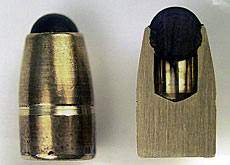Amnesty takes aim at new police bullets

The Swiss branch of Amnesty International has come out strongly against plans to issue "expanding bullets" to the country's police forces.
The human rights organisation says such munitions are banned in wartime under the Hague Declaration of 1899 and it fears there will be a danger of police using “excessive force”.
On Monday the authorities in canton Vaud announced they would be introducing the new bullet, which is more effective at incapacitating targets than standard-issue rounds.
Expanding or “controlled expansion” bullets flatten on impact causing greater tissue damage. Police say those currently in use tend to pass through the body and ricochet, potentially endangering those in the vicinity.
During a shoot-out in Bex, canton Vaud, in October last year, a man who was hit 11 times still managed to kill one police officer and seriously wound another.
Monday’s announcement follows a policy reversal by the government in May this year when ministers declared that border guards and federal police should be issued with expanding bullets.
Five years ago the government ruled against their introduction, citing Switzerland’s commitment to international humanitarian law. But pressure from parliamentarians and police chiefs led to this year’s U-turn.
Reservations
The Swiss branch of Amnesty International, which opposed a previous attempt to introduce expanding bullets in 2001, says it has serious reservations about the ammunition.
“We still think that as these bullets are prohibited for use in wartime that Switzerland, as the depositary state of the Geneva Conventions, should not introduce them,” spokesman Jürg Keller told swissinfo.
“In the event that they are introduced, we believe they should not be issued to all officers but only to special units, such as anti-terrorist police. I don’t think the authorities should go further than this. There is a real danger of excessive force.”
Such a move, however, would appear to be unlikely. Canton Geneva said on Tuesday that it intended to follow the lead taken by neighbouring Vaud and issue expanding bullets to all officers from the start of next year.
Christophe Zawadzki, spokesman for Geneva police, said the practical requirements – the exact type of ammunition and training – would be fixed at a meeting of police chiefs from eight cantons in September.
Border guards
The Federal Police Office told swissinfo that it would shortly begin carrying out tests to decide which type of expanding bullet would be issued to border guards and federal police officers.
Spokeswoman Danièle Bersier said this would be done in conjunction with the cantons, which are responsible for policing in their areas, to ensure everyone used the same ammunition.
Bersier added that the experience of neighbouring Germany had shown that expanding bullets were no more dangerous than those currently in use.
“Germany has been using expanding bullets for about four years and the mortality rate has not risen as a result,” she said.
Romano La Harpe, deputy director of forensic pathology at Geneva University, endorsed this view, saying the use of expanding bullets was likely to lead to larger but less penetrating wounds.
“The bullets in use at the moment generally pass through the body; therefore there is a greater chance of them striking a vital organ,” he said.
“Expanding bullets should not do this, but the wounds resulting from their shallower impact will be more serious. On the other hand, this will avoid the possibility of two or three people being struck by the same bullet.”
But the Swiss Medical Association takes a markedly different view. It adopted a firm position against expanding bullets some years ago and says it remains categorically against their introduction in Switzerland.
“The Swiss Medical Association has repeatedly expressed its concerns about new ammunition that causes permanent injury or which results in an increase in life-threatening injuries,” said spokesman Daniel Lüthi.
swissinfo, Adam Beaumont
Police chiefs say Switzerland is one of the only European countries not to use expanding bullets. They say the only other exceptions are Sweden and Finland, which use hollow-point ammunition.
Cantonal police forces first called for the introduction of more effective ammunition in 2001. They argued that in 60% of cases, suspects shot with standard-issue rounds were able to flee or fight back.

In compliance with the JTI standards
More: SWI swissinfo.ch certified by the Journalism Trust Initiative
You can find an overview of ongoing debates with our journalists here. Please join us!
If you want to start a conversation about a topic raised in this article or want to report factual errors, email us at english@swissinfo.ch.